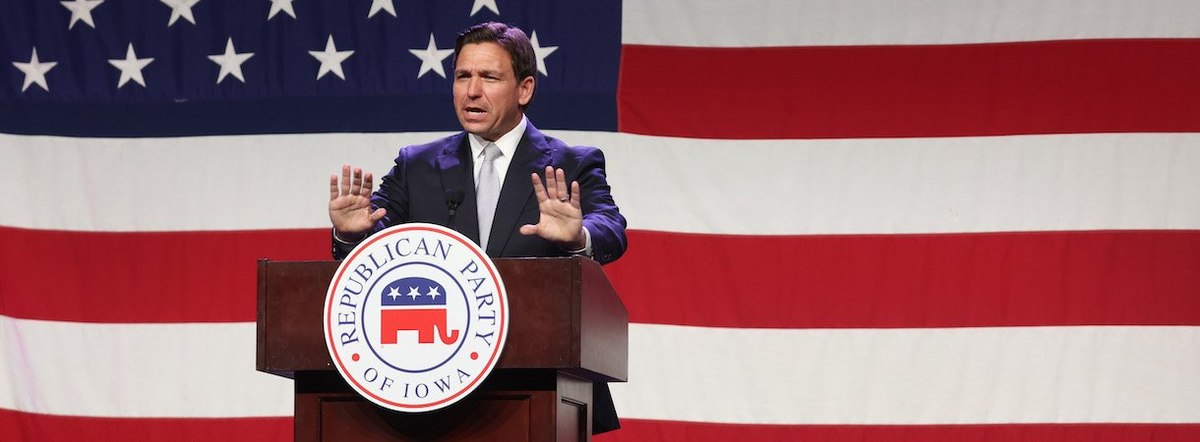New polling from the Economist/YouGov finds that about half of Republicans and Republican-leaning Independents (53%) prefer Donald Trump as their 2024 presidential candidate for the Republican Party. Trump's lead over his closest rival, Florida Governor Ron DeSantis, has held steady at 38 percentage points among this group; it was 37 points in late July. (Note: Nearly all of this week’s poll participants responded before an indictment of Trump in Georgia was made public Monday night.)
DeSantis remains Republicans and Republican leaners' most common second choice, but his dominance in the runner-up category has fallen sharply in the last month. Just 23% of Republicans and Independents who lean Republican now name DeSantis as their second-choice candidate, down 12 points from 35% a month ago and 5 points from three weeks ago. DeSantis nonetheless remains far ahead of any non-Trump candidates in the share of Republicans and Republican leaners who have him as their first choice, and far ahead of Trump and everyone else in second-choice support.
Many Republicans who prefer Trump list no second choice: One-third (32%) either say they are not sure about a second choice (19%) or say they would not vote (14%). Another 32% name DeSantis as their second choice — far more than name any other candidate but far less than the 48% who named DeSantis in early July.
As for the first Republican primary debate, scheduled for next week in Milwaukee, most Republicans support the requirement for participating candidates to get the support of at least 1% of Republicans in three national polls. But a majority opposes the requirement to have a minimum of 40,000 unique donors. Since last month, Republican opinion has slightly soured on the idea of requiring debate participants to sign a pledge to support the eventual nominee. In late July, Republicans supported requiring a loyalty pledge by 8 points (54% to 46%); now, they oppose it by roughly the same margin (53% to 47%).
Many Republicans are willing to give Trump a pass on the loyalty pledge. He has said he would not sign one. By a margin of 76% to 24%, Republicans think Trump should be allowed to participate in the debate even if he does not sign a loyalty pledge. Nearly all Republicans who say Trump is their preferred candidate (94%) say he should be able to participate without signing a pledge. Republicans who name a candidate other than Trump as their top choice are more divided: 48% say Trump should be allowed to participate without a loyalty pledge and 52% say he should not be allowed. Even among Republicans who, generally speaking, support requiring a loyalty pledge for debate participants, 59% say Trump should be allowed to participate even if he doesn't sign one.
The 2024 general election race remains close, whether it is framed as between generic Democratic and Republican candidates or as between the parties' most likely nominees, Joe Biden and Trump. Registered voters divide evenly in their general presidential preference: 42% prefer a Democratic candidate and 42% prefer a Republican candidate. The margin is nearly as close when the choice is between Biden and Trump: 43% prefer Biden and 42% prefer Trump. In each case, more than one in 10 voters aren’t sure whom they prefer.
As for which candidate registered voters say would win a race between Biden and Trump, Biden is the favorite for 42% and Trump for 38%. One in five aren’t sure about the outcome.
Trump historically has received higher marks on strength of leadership relative to Biden. A majority of Americans overall (56%, including 25% of Democrats and 90% of Republicans) say Trump is a very or somewhat strong leader, compared with just 36% of Americans overall (including 73% of Democrats and 9% of Republicans) who say the same about Biden.
Biden is seen as honest and trustworthy by more Americans than say the same about Trump, though neither is seen that way by many Americans. Just over one-third of Americans (36%) say Biden is honest and trustworthy; 28% say Trump is.
See the toplines and crosstabs from the Economist/YouGov poll conducted on August 12 - 15, 2023 among 1,500 U.S. adult citizens.
Methodology: Respondents were selected from YouGov’s opt-in panel using sample matching. A random sample (stratified by gender, age, race, education, geographic region, and voter registration) was selected from the 2019 American Community Survey. The sample was weighted according to gender, age, race, education, 2020 election turnout and presidential vote, baseline party identification, and current voter registration status. Demographic weighting targets come from the 2019 American Community Survey. Baseline party identification is the respondent’s most recent answer given prior to November 1, 2022, and is weighted to the estimated distribution at that time (33% Democratic, 31% Republican). The margin of error for the overall sample is approximately 3%.
Image: Getty (Scott Olson)











